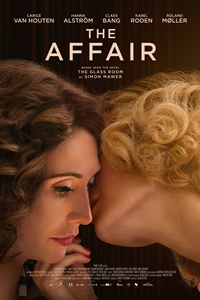The Affair (Skleneny pokoj) () ★★½
 The Affair is a tale of thwarted romance that spans decades. It aims to be an epic saga illustrating how war, governmental policy, cultural shifts, and geography place invisible barriers that keep two lovers apart for a generation during the middle years of the 20th century. The problem with The Affair is that once the World War II segments have ended, the movie loses its momentum and ability to balance both sides of the romance. The film's final 40 minutes, which chronicle the years between VE Day and the end of the so-called "Prague Spring" (1968), may be confusing historically to those without sufficient background.
The Affair is a tale of thwarted romance that spans decades. It aims to be an epic saga illustrating how war, governmental policy, cultural shifts, and geography place invisible barriers that keep two lovers apart for a generation during the middle years of the 20th century. The problem with The Affair is that once the World War II segments have ended, the movie loses its momentum and ability to balance both sides of the romance. The film's final 40 minutes, which chronicle the years between VE Day and the end of the so-called "Prague Spring" (1968), may be confusing historically to those without sufficient background.
When the movie was originally released, it bore the moniker of The Glass Room. That title, although appropriate for the story, was deemed unmarketable so the film was re-named The Affair. This could lead to some confusion because, in addition to not really being about an affair, it has the same title as a recent Showtime TV series/
The movie opens in 1930s Czechoslovakia with its focus on the newly married cosmopolitan Jewish couple of Liesel (Hanna Alstrom) and Viktor (Claes Bang). Viktor commissions a unique house from noted architect Von Abt (Karel Roden). Marriage doesn't go smoothly for the couple, however. Viktor is unfaithful and Liesel develops romantic feelings for her friend Hana (Carice van Houten). Then the war arrives and, as the Nazi shadow falls across the land, Liesel and Viktor are forced to flee to Switzerland. Hana remains behind. As things grow darker in German-occupied Czechoslovakia, Liesel and Hana attempt to maintain a correspondence but many of their letters are intercepted and things don't improve once the Soviets come into the picture.
For roughly an hour of the 104-minute running time, The Affair balances the soap opera elements of Liesel and Hana's slow-burn romance and Viktor's infidelity with the dangers presented by the advance of World War II. Even after the characters are separated, the movie presents an effective chronicle of the difficulties faced by Liesel in exile (where her lifestyle is greatly diminished from what she's accustomed to) and Hana, now the mistress of the airplane designer who has moved into Liesel and Viktor's house. After the war, the filmmakers struggle to encapsulate two decades of history into about a half-hour. The focus is almost exclusively on Hana - Liesel becomes an off-screen presence who reemerges in the final 15 minutes.
One of the most important aspects of any romance, regardless of the sexual orientation of the characters, is that the connection between the lovers has to be palpable. Here, in large part because the two spend so little time together before circumstances force them apart, the chemistry never develops. The Affair is most interesting in the way it provides a window into history from the waning days of the short-lived First Republic to the Warsaw Pact intervention that ended the liberalization of the Prague Spring. The film's attempts to trace the lives of individuals through this turbulent period doesn't succeed as well as it might, despite strong performances by the three leads. This may be a case when a complex and detailed novel is able to paint a canvas that loses too much when animated for the screen with the attendant compromises necessary to achieve a reasonable running time.
History buffs, especially those with an affinity for World War II stories and/or an interest in 20th century Czechoslovakia, may enjoy what The Affair has to offer. Those more intrigued by the lesbian romance might be disappointed by the disjointed manner in which it is represented and the difficulty of maintaining its allure to viewers when the characters are separated for an extended period.
© 2021 James Berardinelli
To get the full Quicklook Films experience, uncheck "Enable on this Site" from Adblock Plus
box office top 10

Civil War Released: April 12, 2024 Cast: Kirsten Dunst, Wagner Moura 11.1M

Abigail Released: April 19, 2024 Cast: Melissa Barrera, Dan Stevens 10.2M

Godzilla x Kong: The New Empire Released: March 29, 2024 Cast: Rebecca Hall, Brian Tyree Henry 9.5M

The Ministry of Ungentlemanly Warfare Released: April 19, 2024 Cast: Henry Cavill, Eiza Gonzalez 9M

Spy x Family Code: White Released: April 19, 2024 Cast: Takuya Eguchi, Saori Hayami 4.9M

Kung Fu Panda 4 Released: March 8, 2024 Cast: Jack Black, Viola Davis 4.6M

Ghostbusters: Frozen Empire Released: March 22, 2024 Cast: Paul Rudd, Carrie Coon 4.4M

Dune: Part Two Released: March 1, 2024 Cast: Timothée Chalamet, Rebecca Ferguson 2.9M

Monkey Man Released: April 5, 2024 Cast: Dev Patel, Sikandar Kher 2.2M

The First Omen Released: April 5, 2024 Cast: Nell Tiger Free, Bill Nighy 1.7M






